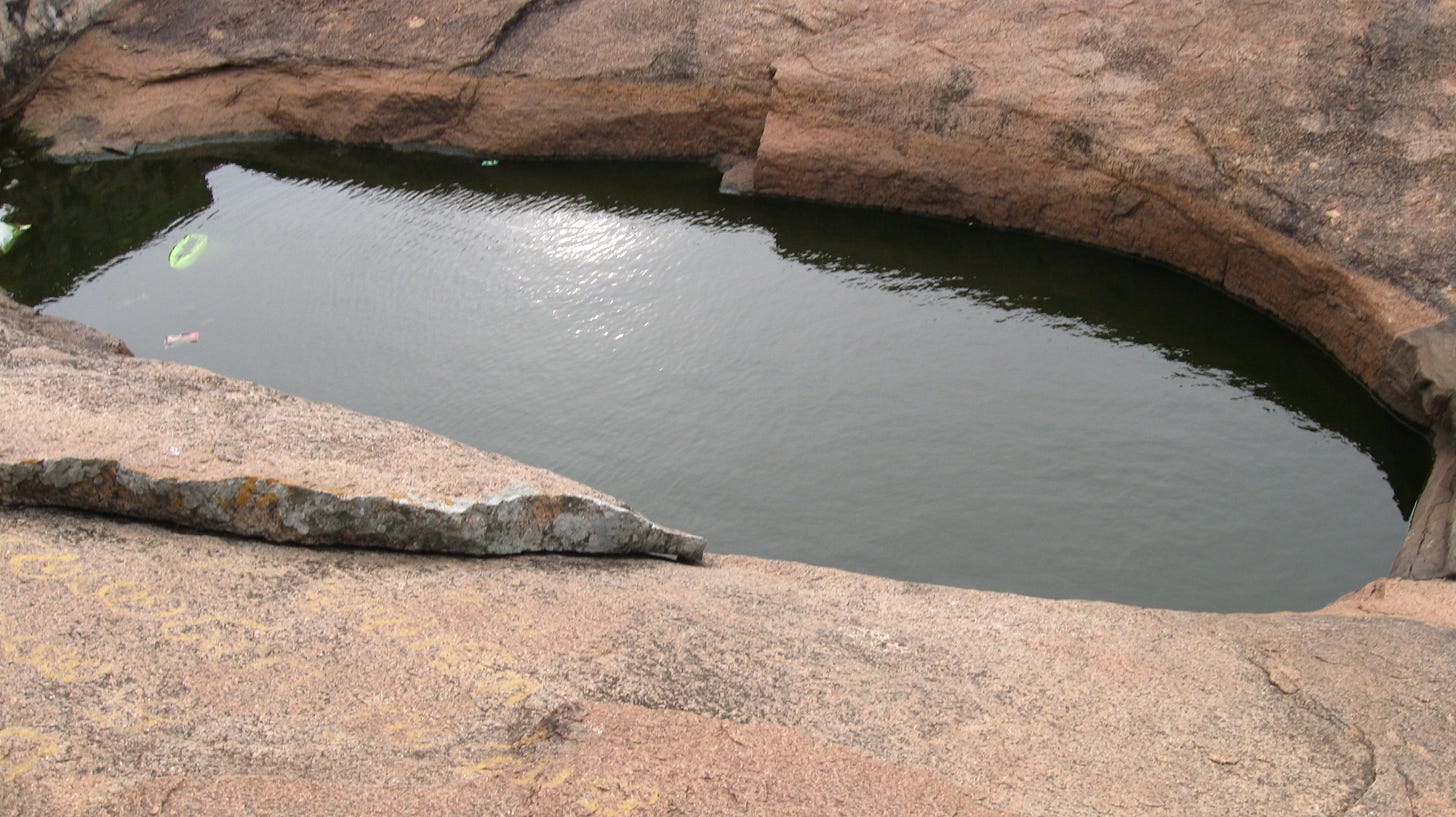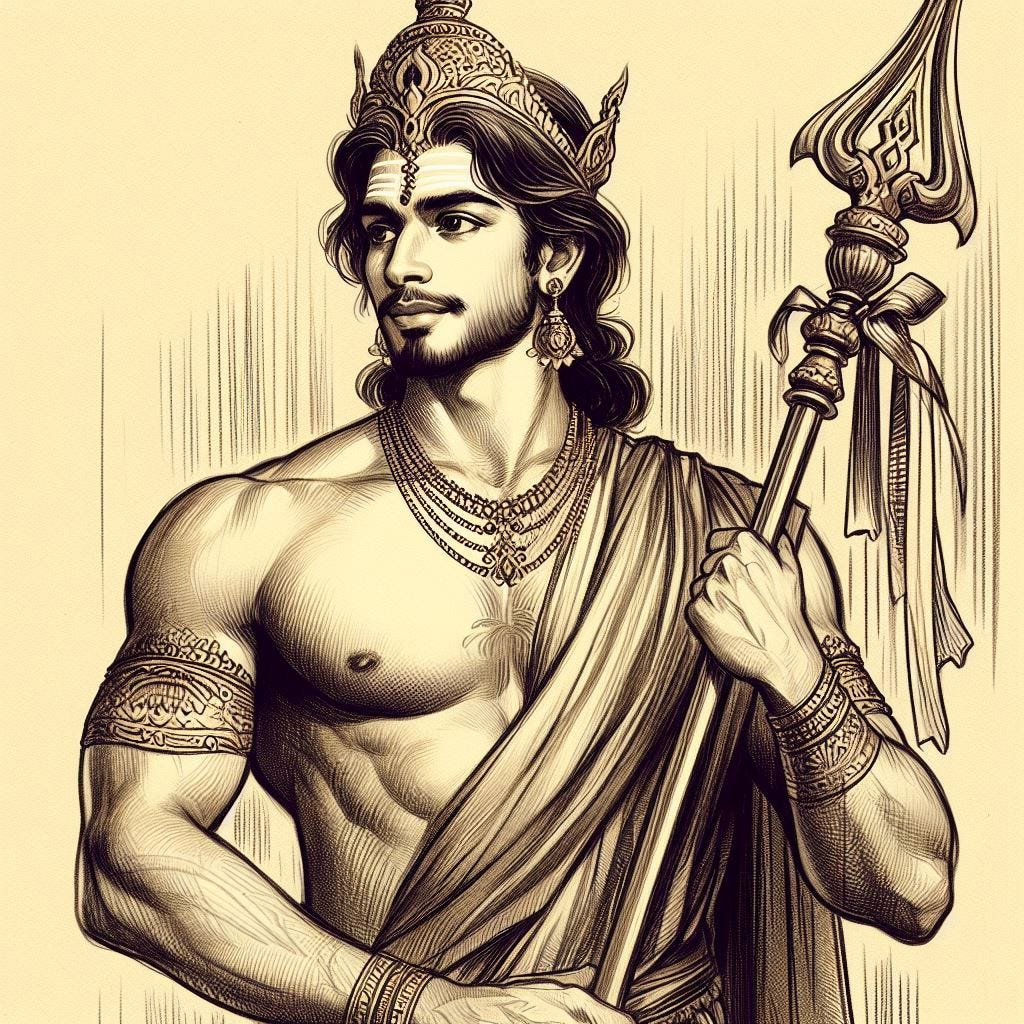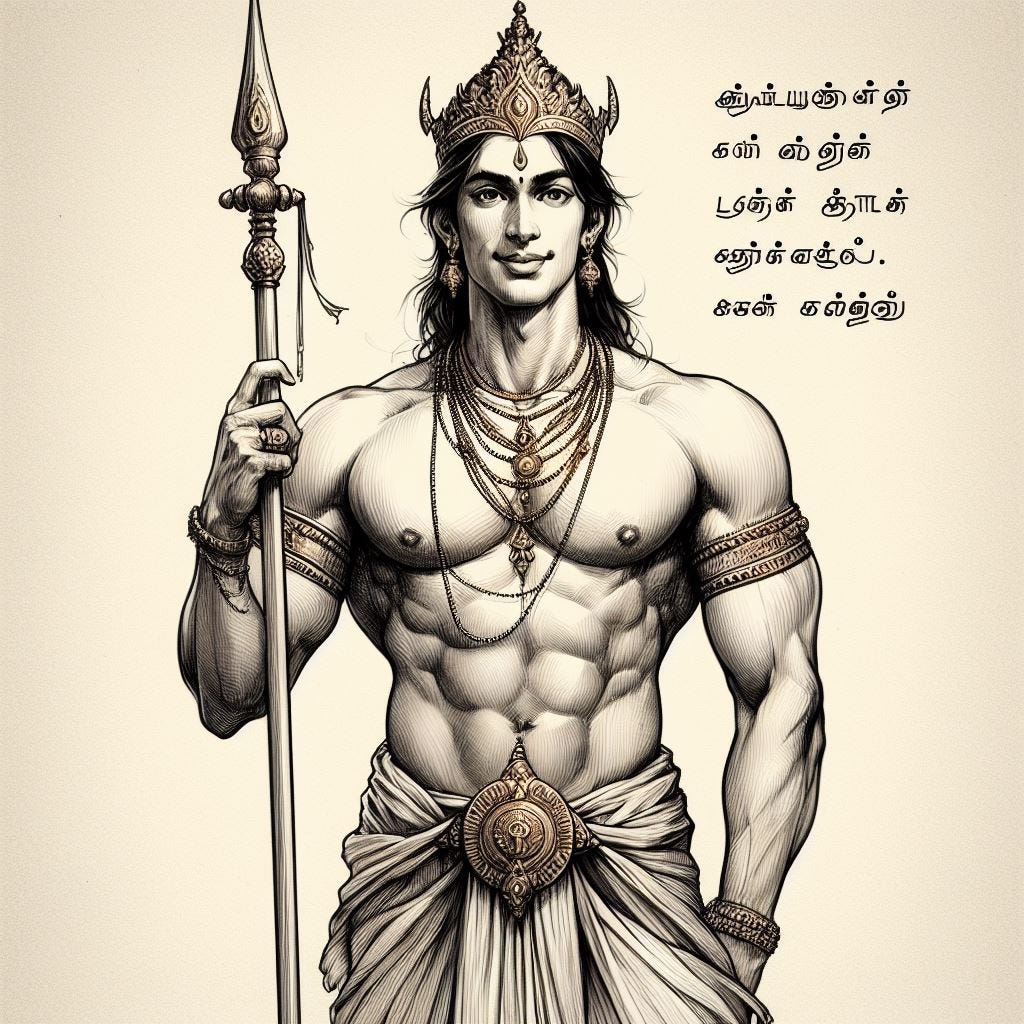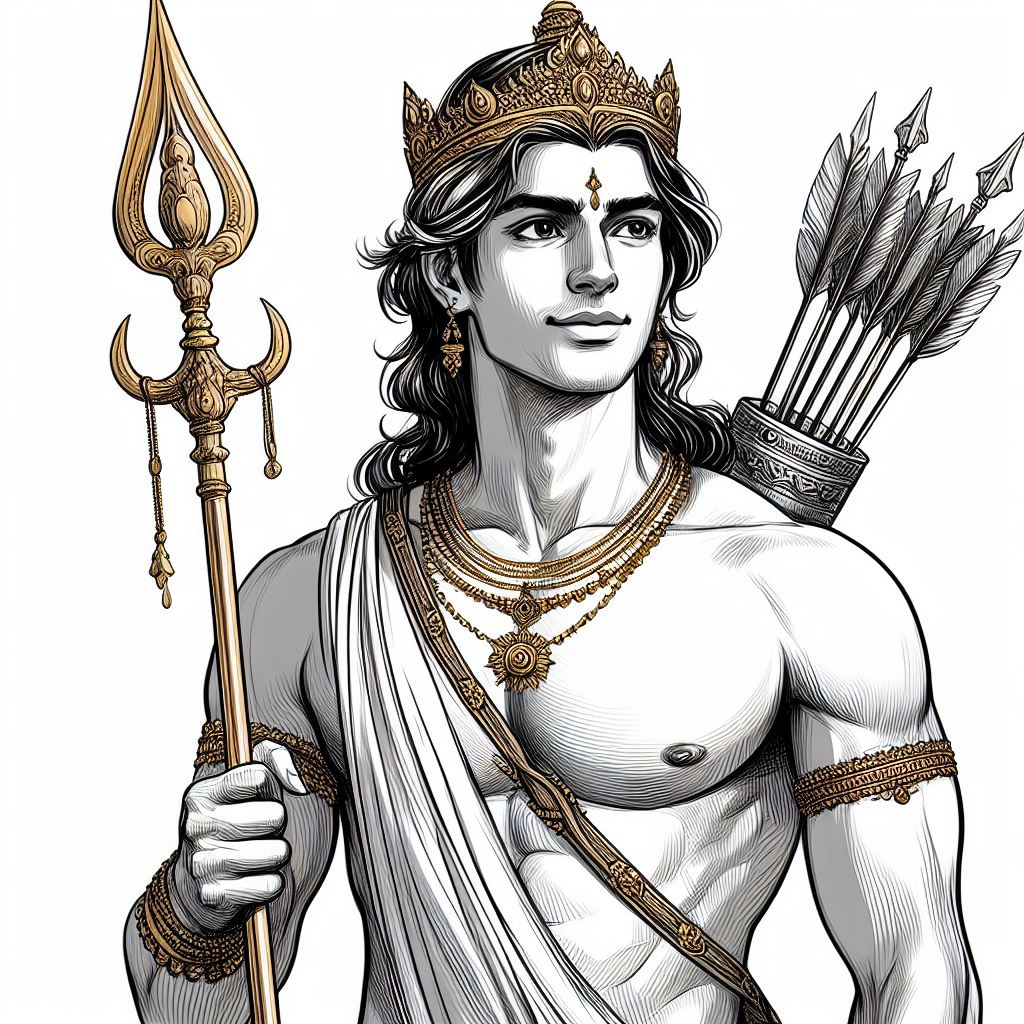The Great Pāri, who gave his chariot to wild jasmine “முல்லைக்குத் தேர்கொடுத்த பாரி வள்ளல்”
Let's read his story through Purananuru poetries. ^_^
வேல் பாரி Vel Pāri was an ancient Thamizh King, who is regarded as one of the கடையெழு வள்ளல்கள் Kadaiyezhu Vallalgal (“Last Seven Patrons” ) in Thamizh history. These kings were fondly remembered through history, for their compassionate nature (to other beings) and generosity towards the arts and Thamizh.
Vel Pari was known for his valour, a humble Tribal chieftain of the Velir tribe in the mountains, a king who stood up against the Three Main Emperors in ancient Tamil Nadu, the Cheras, Cholas and Pandyas when they waged a war against him.
Vel Pāri gives his chariot to the wild jasmine bush:
Thamizh students will fondly know of Pāri as the extremely generous (almost to the extent of naivety, perhaps) King, with this one story that was taught to them in the Thamizh classes: It goes such that he was exploring the forests on his chariot. When he does, he chances upon a wild jasmine creeper, that, unable to support itself, crawls on the ground, loosing most of its reach to sunlight. Looking at this, Pari separates his golden chariot from his horse, and leaves it beside the crawler, twining the latter around the chariot wheels. He leaves only with his horse back home.
Pari's bestfriend and benefactor, hailed sangam Thamizh poet, Kabilar, sings the former's legend: PURAM 114 ஈண்டு நின்றோர்க்கும் தோன்றும் சிறு வரை, For those who stand here, the mountain appears to be close, சென்று நின்றோர்க்கும் தோன்றும் மன்ற, For those who stand a little further, the mountain will still be visible, களிறு மென்று இட்ட கவளம் போல, நறவுப் பிழிந்து இட்ட கோது உடைச் சிதறல் வார் அசும்பு ஒழுகும் முன்றில், 5 How miserably it stands, where once the courtyards flowed generously with fermenting wine (of honey), pressed out, like they were chewed and spit out by elephants, தேர் வீசு இருக்கை நெடியோன் குன்றே. the hill of the Lord who used to give away chariots! PURAM 105 சேயிழை பெறுகுவை வாணுதல் விறலி! O Female artist who sings and dances, One with a radiant forehead! தடவுவாய்க் கலித்த மா இதழ்க் குவளை Where springwaters sprawl abundantly, offering dark-petalled blue water lillies, வண்டுபடு புது மலர்த் தண் சிதர் கலாவப் Wherein bees swarm over new flowers and cool water sprays, (here) பெய்யினும் பெய்யாது ஆயினும், அருவி It does not matter whether it rains or not, the waterfalls will கொள் உழு வியன் புலத்து உழை கால் ஆக 5 cascade down the canals, into the wide fields ploughed for horse gram, as hillstreams, மால்பு உடை நெடுவரைக் கோடுதொறு இழிதரும் With bamboo ladders hanging and running through it. நீரினும் இனிய சாயல் பாரி வேள்பால் பாடினை செலினே. But even more sweeter than this water, is the grace of Vel Pari, from whom, if you sing, you will earn a crimson ornament! PURAM 106 நல்லவும் தீயவும் அல்ல குவி இணர்ப் Neither good nor bad, are pointed flower clusters, புல் இலை எருக்கம் ஆயினும், உடையவை Even if they are Erukkam flowers with dull leaves, கடவுள் பேணேம் என்னா ஆங்கு God will not disdain whatever flowers their devotees offer them; மடவர் மெல்லியர் செல்லினும், Likewise, even if soft-natured, foolish people approach கடவன் பாரி கைவண்மையே. 5 Lord Pāri, he will not hesitate to reward them generously/Lord Pāri will be bound by his generosity. PURAM 115 ஒரு சார் அருவி ஆர்ப்ப, ஒரு சார் On one side, the waterfall roars, on another side, பாணர் மண்டை நிறையப் பெய்ம்மார், To fill the bowls of bards, வாக்க உக்க தேக் கள் தேறல் Freshly filtered, clear sweet toddy, poured, கல் அலைத்து ஒழுகும் மன்னே, பல் வேல் அண்ணல் யானை வேந்தர்க்கு 5 இன்னான் ஆகிய இனியோன் குன்றே. overflowed and spilt, carrying along pebbles! Such was the mountain, Belonging to the sweet man, who was ferocious, to Kings who commanded many armies and mighty elephants. PURAM 116 தீ நீர்ப் பெருங்குண்டு சுனைப் பூத்த குவளைக் கூம்பு அவிழ் முழு நெறி புரள்வரும் அல்குல், ஏந்து எழில் மழைக் கண் இன்னகை மகளிர் Skirts made from blossomed blue-water lilies, from the deep sweet water springs, sway on the waist of the maidens with beautiful moist eyes and soft smiles. புல் மூசு கவலைய முள் முடை வேலிப் பஞ்சி முன்றில் சிற்றில் ஆங்கண், 5 பீரை நாறிய சுரை இவர் மருங்கின், ஈத்து இலைக் குப்பை ஏறி உமணர் உப்பு ஒய் ஒழுகை எண்ணுப மாதோ, There, where cotton grows in a house, the split path is choked up by grass, thorn bushes fence the area, and Surai and Peerkai gourd vines sprawl, They (maidens) climb over the waste heaps of date palm leaves, and count the salt wagons belonging to salt merchants. நோகோ யானே, தேய்கமா காலை, I am suffering, May my life end! பயில் பூஞ் சோலை மயில் எழுந்து ஆலவும், 10 பயில் இருஞ் சிலம்பில் கலை பாய்ந்து உகளவும், Once, where peacocks rose up and danced in prosperous flower gardens, Monkeys leaped and swung in dense mountain slopes, கலையும் கொள்ளாவாகப் பலவும் காலம் அன்றியும் மரம் பயம் பகரும் Regardless of seasons, the trees bestowed abundant fruits, so many that even male monkeys could not take them all யாணர் அறாஅ வியன் மலை அற்றே அண்ணல் நெடுவரை ஏறித், தந்தை 15 பெரிய நறவின் கூர் வேல் பாரியது They climbed to the summit of such mountains, that were unending in providing prosperity, and plentiful liquor, and belonged to their Father, Vel Pari அருமை அறியார், போர் எதிர்ந்து வந்த வலம்படு தானை வேந்தர் பொலம் படைக் கலி மா எண்ணுவோரே. Knowing naught, the legend of Him, the kings with their great armies that approached the hill in war, Ignorant of how difficult it would be to defeat him, and From the peak, the girls would count the proud horses bearing the (surrendered) iron-weapons of kings! PURAM 117 மைம்மீன் புகையினும், தூமம் தோன்றினும், தென் திசை மருங்கின் வெள்ளி ஓடினும், வயல் அகம் நிறையப் புதல் பூ மலர, மனைத்தலை மகவை ஈன்ற அமர்க்கண் ஆமா நெடுநிறை நன் புல் ஆரக், 5 கோஒல் செம்மையின் சான்றோர் பல்கிப் பெயல் பிழைப்பு அறியாப் புன்புலத்ததுவே, பிள்ளை வெருகின் முள் எயிறு புரையப் பாசிலை முல்லை முகைக்கும், ஆய் தொடி அரிவையர் தந்தை நாடே. 10 Esteemed Doctor Vaidehi Herbert translates this better than anyone else: Even if Saturn smoldered, a comet appeared, or if Venus ran toward the south, his fields were full, bushes blossomed with flowers, and rows of large-eyed wild cows calved in the yards of houses and grazed on good grass. Because of his just scepter, many wise men came to him, rains never failed even in the dry lands, and green-leaved mullai vines have buds looking like the thorny teeth of young wildcats, in their father’s land, the young girls with beautiful bangles.
Pāri’s Downfall
Legend talks that a Chola emperor was once enamoured by the beauty of Angavai and Sangavai, Vel Pari’s two talented daughters, and wanted to possess them. But the Princesses, who did not wish to be mere (one of a 100) concubines of the Chola emperor, rejected the offer, which led to the latter threatening war. Obviously he didn’t offer his daughters even after the taunt, which eventually led to wars…
Apparently, he was a commander skilled in guerilla warfare, where his army used leeches, bees and ants to disrupt the huge warcrowds making their ways up the mountains. He eventually exhausted the three millitaries attempting to capture his kingdom. The war went on for years, until the opposition disguised themselves in the clothing of a musical arts group. As an avid patron of the arts, Pari welcomed them into his land, let them perform, and when he asked them what they wanted as gifts in return, the armies in disguise asked for his Crown. Pāri gave them so, smilingly, having known they were his enemies, but powerless to his ethical virtue to give what was asked from him (he was utterly generous that way) while he was eventually killed.
Pari's bestfriend and benefactor, hailed sangam Thamizh poet, Kabilar, sings, In his appeal to the Three Emperors: PURAM 109 அளிதோ தானே பாரியது பறம்பே! Small and Easy to conquer, looks miserable, does Pari's Parambu (Mountain)! நளி கொள் முரசின் மூவிரும் முற்றினும், With great regal drums, even if all three of you beseige it, உழவர் உழாதன நான்கு பயன் உடைத்தே There will flourish four crops, entirely devoid of farmer intervention ஒன்றே சிறியிலை வெதிரின் நெல் விளையும்மே, Firstly, the tall bamboo with tiny leaves, will yield the harvest of its seeds இரண்டே தீஞ்சுளைப் பலவின் பழம் ஊழ்க்கும்மே, 5 Secondly, with its sweet juicy pulp, the jackfruit will ripen, மூன்றே கொழுங்கொடி வள்ளிக் கிழங்கு வீழ்க்கும்மே, Thirdly, the thick sweet potato (Valli) root, will burgeon with its expansive vine, நான்கே அணி நிற ஓரி பாய்தலின் மீது அழிந்து And fourth, is Honey, with its dark lusciousness pouring, திணி நெடுங்குன்றம் தேன் சொரியும்மே, Consumes the peak of the tall mountain dense with vines, with its flowing colour! வான் கண் அற்று அதன் மலையே வானத்து Look, it is not the sky, it is the mountain! The mountain is the sky, மீன் கண் அற்று அதன் சுனையே ஆங்கு 10 and in that sky, the spring waters gleameth like stars. மரந்தொறும் பிணித்த களிற்றினிர் ஆயினும், Though you have tied your elephants with each tree, புலந்தொறும் பரப்பிய தேரினிர் ஆயினும், Though all your chariots have been spaced over the entire vicinity, தாளின் கொள்ளலிர் வாளின் தாரலன், You cannot defeat him, He will not yield to your sword, யான் அறிகுவென் அது கொள்ளும் ஆறே, I know; The only way through which you will/might capture his land! சுகிர் புரி நரம்பின் சீறியாழ் பண்ணி, 15 If you strum on a tight harp with polished strings, விரை ஒலி கூந்தல் நும் விறலியர் பின் வர, while your women of the musicians' group, with their rich, scented hair, ஆடினிர் பாடினிர் செலினே, follow you, and you approach him dancing and singing, நாடும் குன்றும் ஒருங்கு ஈயும்மே. He will gift you his country and his mountain! PURAM 110 கடந்து அடு தானை மூவிரும் கூடி உடன்றனிர் ஆயினும், பறம்பு கொளற்கு அரிதே, Though with your murderous armies, might you three unite, in your enmity, Parambu will be difficult to seize! முந்நூறு ஊர்த்தே தண் பறம்பு நல் நாடு There are three hundred villages belong to this cool, good Parambu land, முந்நூறு ஊரும் பரிசிலர் பெற்றனர், and all three hundred belong to those who received them from him as gifts யாமும் பாரியும் உளமே, 5 குன்றும் உண்டு, நீர் பாடினிர் செலினே. So if you will approach the mountain, singing to him, you will win us and Pari! Kabilar, writing his poems for Pāri: PURAM 111 அளிதோ தானே பேர் இருங்குன்றே! Pitiful is his great, dark mountain abode! வேலின் வேறல் வேந்தர்க்கோ அரிதே, It is impossible for kings to conquer it with their mighty spears, நீலத்து இணை மலர் புரையும் உண்கண் கிணைமகட்கு எளிதால், பாடினள் வரினே but for a kohl-lined lass, whose eyes resemble blue water lilies, it is easy to win it, if she approaches while singing with a kinai drum! What Pari's two daughters sang: PURAM 112 அற்றைத் திங்கள் அவ் வெண்ணிலவின், On that day, under the white moonlight, எந்தையும் உடையேம், எம் குன்றும் பிறர் கொளார், We had our father with us, and our abode was not taken by others, இற்றைத் திங்கள் இவ் வெண்ணிலவின், On this day, under this white moonlight, வென்று எறி முரசின் வேந்தர் எம் The Kings with royal drums, beat out their victory, குன்றும் கொண்டார், யாம் எந்தையும் இலமே They took our hill, and we, We have no father! What Kabilar sang, as he left the Perambu Mountain: PURAM 113 மட்டுவாய் திறப்பவும், மை விடை வீழ்ப்பவும், To open the wine jar, slaughter rams, and அட்டு ஆன்று ஆனாக் கொழுந்துவை ஊன் சோறும் Thus serve generously, without hesitation, unlimited rice, cooked with stewed fatty meat, பெட்டாங்கு ஈயும் பெருவளம் பழுனி, To bestow great wealth according to நட்டனை மன்னோ முன்னே, இனியே, the wishes of your guests, but presently, பாரி மாய்ந்தெனக் கலங்கிக் கையற்று 5 Now that Pāri has passed, I am helpless, tears well in my eyes, நீர் வார் கண்ணேம், தொழுது நிற் பழிச்சிச் I bow down to you, and worship you, சேறும், வாழியோ, பெரும் பெயர்ப் பறம்பே, I am leaving, O' famed Parambu hill, கோல் திரள் முன் கைக் குறுந்தொடி மகளிர் நாறு இருங்கூந்தல் கிழவரைப் படர்ந்தே. As I leave, I search for the men (on earth?) who will have the right to touch the black, fragrant tresses of your daughters that wear rows of rounded, thick bangles on their forearms. Mourning over the loss of Pāri: PURAM 118 அறையும் பொறையும் மணந்த தலைய, எண் நாள் திங்கள் அனைய கொடுங்கரைத் தெண்ணீர்ச் சிறு குளம் கீள்வது மாதோ, The small reservoir, with clear water and shoreline curved like the eighth-day moon, is now shattered with boulders and residue on the top, கூர் வேல் குவைஇய மொய்ம்பின் தேர் வண் பாரி தண் பறம்பு நாடே. 5 in the land that was once governed under Pari's authority in cool Parambu, Whose massive arm carried a sharp spear, and who donated chariots. PURAM 119 கார்ப் பெயல் தலைஇய காண்பு இன் காலைக், களிற்று முக வரியின் தெறுழ் வீ பூப்பச், செம்புற்று ஈயலின் இன் அளைப் புளித்து, மென்தினை யாணர்த்து நந்தும் கொல்லோ, During the (visually - sweet to the eye) sweet times when monsoon rains gushed down, the therul flowers bloomed, resembling the decorative paint on the faces of elephants, and termites from red mounds Curries made of tamarind and sweet buttermilk, and the soft millet flourishing abundantly, Will they cease to exist? நிழல் இல் நீள் இடைத் தனி மரம் போலப், பணை கெழு வேந்தரை இறந்தும், இரவலர்க்கு ஈயும் வள்ளியோன் நாடே? He who was like a single tree, in a long shadowless road, Who gave more than other kings with regal drums, To those who came to him in need, Is this land (of the generous lord) ruined? PURAM 120 வெப்புள் விளைந்த வேங்கைச் செஞ்சுவல் கார்ப் பெயல் கலித்த பெரும்பாட்டு ஈரத்துப், Over the fields where intense heat hovered, On those red hills where Vengai trees grew tall, Where monsoon rains caused great moisture, பூழி மயங்கப் பல உழுது, வித்திப் பல்லி ஆடிய பல் கிளைச் செவ்விக் களை கால் கழாலின் தோடு ஒலிபு நந்தி, 5 The land is ploughed thoroughly and regularly, eventually seeded, And when many saplings rise, entwining with Palli weed, Using harrows, they uproot those weeds, allowing the crops to grow well with many stems and big ears, மென்மயில் புனிற்றுப் பெடை கடுப்ப நீடிக், கருந்தாள் போகி ஒருங்கு பீள் விரிந்து, When the black stalks grow tall, resembling the colour Of a delicate peahen that had just hatched eggs, கீழும் மேலும் எஞ்சாமைப் பல காய்த்து, Up and down, without lacking, it yields bountifully, வாலிதின் விளைந்த புது வரகு அரியத் They harvest this new millet that has matured, தினை கொய்யக் கவ்வை கறுப்ப, அவரைக் 10 It is time to collect the ___(idk)___, Avarai beans கொழுங்கொடி விளர்க்காய் கோள் பதம் ஆக, நிலம் புதைப் பழுனிய மட்டின் தேறல் Densely reaping in every household. புல் வேய்க் குரம்பைக் குடிதொறும் பகர்ந்து, In the huts covered with grass, they share filtered toddy, நறு நெய்க் கடலை விசைப்பச் சோறு அட்டுப் that had been buried and matured in liqour jars, and roasting kadalai/pulses in fragrant ghee, they cook their rice, பெருந்தோள் தாலம் பூசல் மேவர, 15 Women with broad shoulders serve the food in large plates, வருந்தா யாணர்த்து நந்தும் கொல்லோ, So that people can mix it up and eat from it together, In that land where bamboo wavers and rustles on the peaks, இரும் பல் கூந்தல் மடந்தையர் தந்தை There is the father, of the girls with luxuriant black tresses, ஆடு கழை நரலும் சேட் சிமைப் புலவர் Who is endlessly praised and sung about by poets, பாடி ஆனாப் பண்பின் பகைவர் and who listens to the clanking of ஓடு கழல் கம்பலை கண்ட 20 war anklets, worn by the enemies that flee from his land, செரு வெஞ்சேஎய் பெருவிறல் நாடே. He is the Victorious king, who longed for war, like Murugan (War deity). Does no one feel sorry for the vanquish of the prosperity?
I did not include all of Kabilar’s Puram poems on Vel Pari; I excluded a few because I was actually struggling to decipher the words, and I am sure there are actual sites by scholars that explain and provide better translation for the poems! But I made sure to pick all the poems that would provide ample insight into Vel Pāri’s legend, and the Thamizh Sangam society, under his rule.

So, what do you guys think?
My impressions of Vel Pāri:
Initially, I though that he must be of a character that is so generous, to the point of unnecessary naivety that might hurt him. Well, maybe it did eventually, but we cannot help but empathise with him, due to his good nature, and actually count his downfall as a moment of weakness that was taken advantage of, by the three emperors conspiring against him (well, it was a dirty tactic that they annexed his lands that way). Eventually I had to turn a blind eye to his one little flaw, and as a fangirl of historical legends, I can’t help but gush over his selfless patronising of the arts anyway *cries* if I lived under the rule of such a king, so would I write and sing for him!
Adios my loves!






